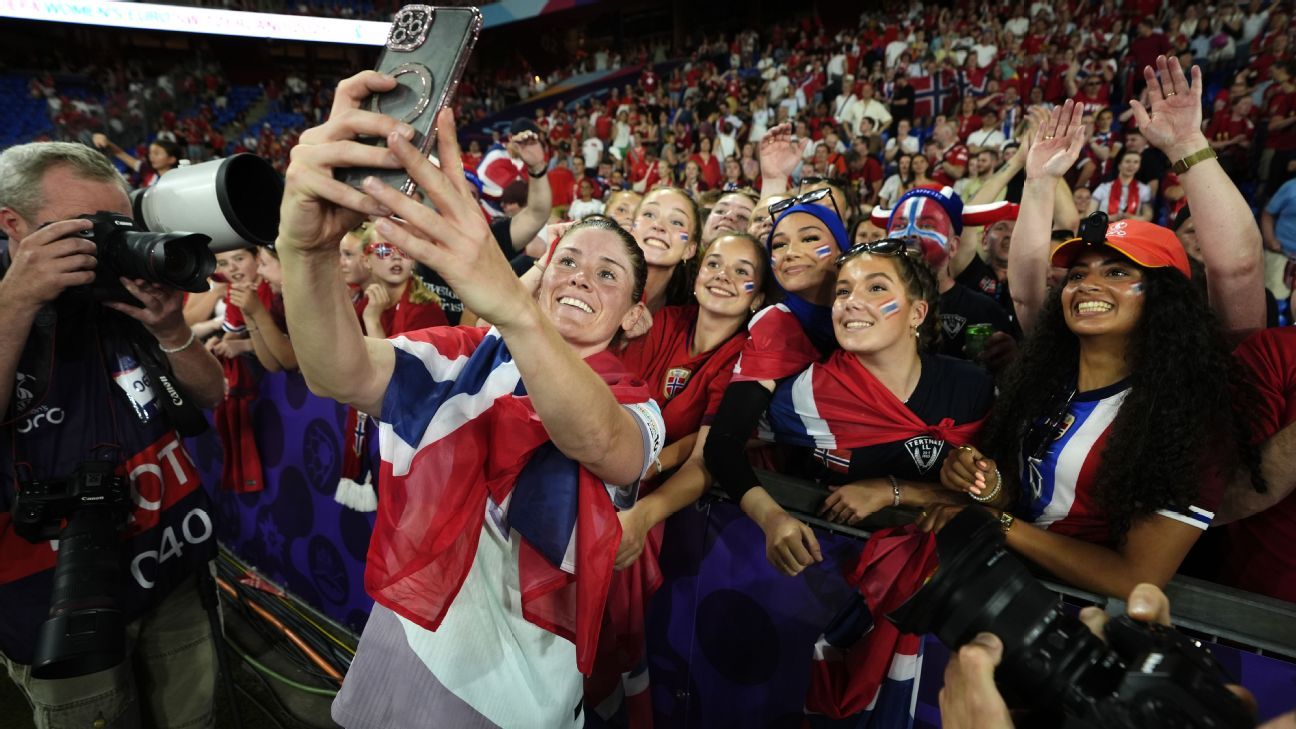Zurich – Maren Mjelde, who has sung the Norwegian national anthem countless times, performed it for her country during the Euro 2025 opener against Switzerland on July 2. This marked her ninth major tournament, although it also showcased some moments of vulnerability.
Just three months prior, the 35-year-old defender faced doubts about her fitness following a partial Achilles tear and a knee injury that raised concerns about her ability to walk again. Driven by her desire to represent Norway in a major tournament as she had in 2022, she pushed through physical pain to take the field.
Before Euro 2025, Mjelde’s place as one of Norway’s all-time greats was already secure. Beginning her career at Arna-Bjørnar, she played in various clubs across Germany, Sweden, and Norway, eventually joining Chelsea in 2017. Over the course of 140 appearances, she collected six Women’s Super League titles and four FA Cups, with legendary manager Emma Hayes referring to her as a “Rolls-Royce football player.”
Mjelde has been a foundational figure for the Norwegian national team since her debut 18 years ago, serving as a steadfast captain through victories and setbacks alike. As Norway gears up for the quarterfinals against Italy, Mjelde is just seven caps away from surpassing Hege Riise’s record as the most capped player in Norwegian history and shows no signs of retiring soon.
Early Promises
Mjelde credits Arna-Bjørnar for her development as a player. Starting out playing football with her brother and his friends, she later joined the boys’ team and eventually earned a spot on Norway’s U17 women’s team at just 14. However, she initially opted for a handball career when choosing her college path at 16.
For a time, she balanced handball during the day and football in the evenings, but after making her senior Norwegian debut at 17 against Russia in 2007, she decided to focus solely on soccer, recognizing that her aggressive style in handball didn’t align with the needs of a professional soccer athlete.
Just two years later, Mjelde made headlines when she was quickly elevated to Norway’s squad for Euro 2009, amidst controversy caused by five senior players boycotting the team after the coach’s dismissal.
Norway advanced to the semi-finals but lost to Germany, a team that dominated the Euros from 1995 to 2013. The Norwegians reached the finals again in Euro 2013, only to face the same opponent.
Mjelde recalled, “That’s one of my best memories with the national team. We had a lot of experienced players and a clear plan from our coach.” The team’s unity and responsibility fostered an excellent environment, making their run to the finals unforgettable.
“I once thought about giving up on playing.”
Throughout much of Mjelde’s career, injuries had spared her until a fateful day in the Conti Cup final against Bristol on March 14, 2021. In the 81st minute, she sustained a severe knee injury that left her in immense pain and affected her career trajectory.
She completely tore her medial collateral ligament (MCL) and dislocated her kneecap, leading to a challenging rehabilitation process. “I struggled to walk properly for three months,” she shared. “Every day during my six-month recovery, I questioned if I would ever be okay again.”
Support from teammates, like Gro Leiten, who joined her during rehabilitation, helped her push through. “I relied heavily on the support around me during my recovery,” she recalled.
About 260 days post-injury, Mjelde made her comeback for Chelsea on November 9, 2021, against Selvet. “You can’t teach football intelligence like that. Mjelde is one of the world’s most underrated players,” someone remarked at the time.
In June 2022, she was appointed captain of Norway for Euro 2022— though it also included tough moments. After a strong win against Northern Ireland, Norway suffered a devastating 8-0 defeat to England, followed by a loss to Austria, leading to an early exit from the tournament.
Mjelde stated, “That 8-0 loss still haunts me. I can’t wrap my head around it even days later. I was lost for words facing the media afterward. It was perhaps the most painful experience of my career.”
A Tough Decision Ahead
0:59
Exploring how Norway and Switzerland made history in women’s Euro football
Watch Norway’s 2-1 win at the Swiss Women’s European Championship.
Following the disappointment of the 2023 World Cup, where Norway exited in the round of 16, Mjelde returned to Chelsea in August. But by February, she learned her contract would not be renewed.
“When I left Chelsea, my sole mission became the Euro,” she stated. “While some choices may not have seemed practical, I felt compelled to pursue my goals.”
There were whispers about Mjelde’s return to Arna-Bjørnar being a precursor to her retirement, especially since her brother was the coach. She took on the role of guiding the younger players as they battled relegation.
“It was a stark contrast to my Chelsea days,” she noted. “I was unaccustomed to having to handle everything myself, like bringing my own water to training.”
“Leaving Chelsea felt like losing a piece of myself. Coming back home felt right. Many assumed I was done playing. But my goal was to rebuild myself and make it to the Euros.
However, after the Norwegian season ended in November, Mjelde needed to find a new club to maintain her fitness. With a transfer deadline looming, her agents reached out to various clubs to explore options for her return. As time rushed forward and nothing materialized, she recalls, “I remember going home one day, completely exhausted after training, and took a nap.”
Later, she woke to multiple missed calls from her agent: Everton needed her following an injury to their captain, and she joined the team soon after.
Mjelde made an impressive start with Everton, scoring in a match against Aston Villa, but another injury struck during a game against Manchester United, leading to an Achilles injury just three months before the Euros.
With limited time to recover, she faced the challenge of rehabilitation alone once again. “I couldn’t believe the timing; I thought, how can this happen?” she expressed. “Multiple platelet-rich plasma therapies followed, and during my second round, I wondered how I’d make it to the Euros, but I knew I had to make the most of it.
Leveraging Experience
Mjelde was initially named as a reserve for Norway’s Euro squad, but after another injury among the center-backs, she was called up for her significant experience. When the team prepared for a Nations League match, the coaching staff assured her she looked match-ready, ultimately selecting her for the tournament.
After returning home to focus on her fitness, Mjelde awaited the squad announcement. On June 16, she received the coveted news: she would be part of the team.
Mjelde played in Norway’s opening and closing group matches against Switzerland and Finland, helping lead Norway to victories that positioned them at the top of Group A, with hopes set on the quarter-finals against Italy and potentially the semi-finals against either England or Sweden.
Despite the presence of spectacular talents like Caroline Graham Hansen and Ada Hegerberg, Norway hasn’t replicated the successes of 2013. Mjelde remarks that while winning major tournaments is more challenging, the Norwegian team carries a sense of optimism that they can achieve something remarkable this year.
As for Mjelde’s future, questions arise regarding her participation in the 2027 World Cup. She chuckles, “The tenth major tournament? Not sure if that’s likely.” However, she expresses gratitude for her experiences. “Being captain for a decade has been a tremendous honor, and I take pride in my lengthy tenure with the team.”
Fan Take: This news is significant for soccer fans as it highlights the resilience of veterans like Maren Mjelde, demonstrating that even after facing serious injuries and setbacks, players can bounce back and make a difference on the biggest stages. Her journey not only inspires future generations but also underscores the growing popularity and competitiveness of women’s soccer worldwide.



